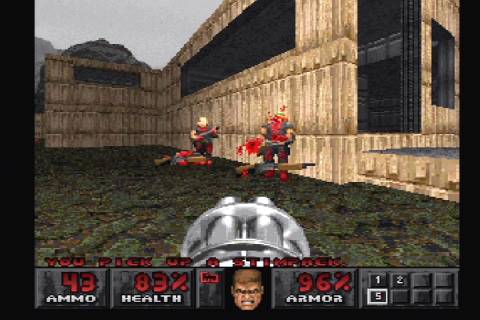
"For those of us who develop games, our right to express ourselves is hanging in the balance." -- Insomniac Games CEO Ted Price in a blog post last year
The future of video games as a creative medium may change Monday. The U.S. Supreme Court is expected to issue a ruling on Brown v. EMA, otherwise known as that violent video game court case you've seen so much coverage about in the past. The ripple effect could be tremendous.
The case was previously known as Schwarzenegger v. EMA, changed to reflect California's newly elected governor, Jerry Brown.
"We can all agree that parents are the best arbiters of determining what is right for their children," said Entertainment Software Association (who is arguing the case) president Michael Gallagher in an editorial for U.S. News. "The issue at hand though is how best to support those parents. [...] As a medium, computer and video games are entitled to the same protections as the best of literature, music, movies, and art. In the end, Americans’ rights to speech and expression are sacred and inviolate--and millions across the political spectrum agree with us."
In short, the case concerns the sale of violent games. There have been attempts by states to classify violent games differently than how material is treated in other mediums, be it music, movies or literature. All of these laws, even those that were passed, were eventually struck down by the courts, declared an infringement on First Amendment rights. Games are protected speech.
But are all games?
"Congress shall make no law respecting an establishment of religion, or prohibiting the free exercise thereof; or abridging the freedom of speech, or of the press; or the right of the people peaceably to assemble, and to petition the Government for a redress of grievances."
That's the First Amendment, obviously.
== TEASER ==Oral arguments for the case were heard in November, but the Supreme Court doesn't immediately issue a verdict. It's expected but not assured we'll hear a decision Monday. The case itself concerns a 2005 law passed in California (California Civil Code sections1746-1746.5, which you can read for yourself here) that would regulate the sale and rental of violent games to minors.
The law defines the classification of a "violent video game" in this way:
(1) "Violent video game" means a video game in which the range of options available to a player includes killing, maiming, dismembering, or sexually assaulting an image of a human being, if those acts are depicted in the game in a manner that does either of the following:(A) Comes within all of the following descriptions:
(i) A reasonable person, considering the game as a whole, would find appeals to a deviant or morbid interest of minors.
(ii) It is patently offensive to prevailing standards in the community as to what is suitable for minors. (iii) It causes the game, as a whole, to lack serious literary, artistic, political, or scientific value for minors.
The question at hand is whether games, like other media, are fully protected under the Constitution. The law, as written, would make selling a violent game to minors a criminal offense, moving from industry self regulation to potential fine--up to $1,000 per violation, in fact. This doesn't mean your average GameStop clerk would be fined, as the violation would only apply to those with "ownership interest" (.e. a store manager), but retailers would be at risk.
"California has a compelling interest in protecting the physical and psychological care of minors," reads an amicus brief filed by California state senator Leland Yee. "When juxtaposed against the backdrop of protecting the First Amendment, this Court has held that the Constitution does not confer the protection on communication aimed at children as it does for adults. When weighing the conflicting concerns of minors this Court correctly carved a flexible standard of review and not a strict scrutiny approach. We know, of course, that a state can prohibit the sale of sexually-explicit material to minors under a 'variable obscenity' or 'obscenity as to minors' standard.
Yee is a well known supporter of these kinds of laws.
An amicus brief, by the way, is basically an argument filed on behalf of each side, typically by someone who will be affected by the outcome. It's meant to be complimentary.
Yee, and many others, argue violent videogames fall under the same categorization as pornography. The status of pornography was largely defined by Miller v. California in 1973, which declared content marked as "obscene" was not protected by the First Amendment. The case resulted in what's referred to as the "Miller Test," which is alluded to in the California law.
The "Miller Test" (the whole text of the decision can be found here) is divided into three parts:
(a) whether "the average person, applying contemporary community standards" would find that the work, taken as a whole, appeals to the prurient interest, Roth, supra, at 489,
(b) whether the work depicts or describes, in a patently offensive way, sexual conduct specifically defined by the applicable state law, and
(c) whether the work, taken as a whole, lacks serious literary, artistic, political, or scientific value.
If a work fits all three, it's considered "obscene." Just swap the sexual terminology for violence.
The crux of this case is whether government, not industry, should protect minors. Parents are still allowed to purchase whatever they please for their children. The fear from the industry is the classification of obscene, lumping games in with pornography, and the requirements for games to be labeled. It could prompt a chilling effect on the creativity of the medium. Games are entertainment--they need to make money. If the commercial market for these games was restricted, what would be the point of making them? You'd be catering to a niche market.

"As content creators, if there is a chance that our games will appear in an 'Adults Only' section of game stores we will have to restrict what we create to avoid going out of business," said Price.
The law itself does not specify an "Adults Only" section, but it does require some labeling through a "solid white '18' outlined in black" 2x2 inches sticker on the box.
Several companies filed briefs defending games, including Activision and id Software.
"As a matter of content and form, video games are a projection of such traditional media as literature and film, both of which the First Amendment protects in full," reads the brief from id Software. "In fact, the themes on which video games rely are staples of fiction. This being true, this Court could not deny full protection to video games without making an artificial distinction among forms of art."
Naturally, others disagree. One brief represented the attorneys general of Louisiana, Connecticut, Florida, Hawaii, Illinois, Maryland, Michigan, Minnesota, Mississippi, Texas and Virginia.
"California’s law falls squarely within the limits on juvenile freedoms which this Court has upheld" reads the brief. "In fundamental realms--such as voting, marriage, contracts, privacy, travel, juries, sentencing, and speech--states may (and sometimes must) treat minors in ways that would be inconceivable for adults. California’s law is situated within this sensible and laudable tradition. If a state may restrict a minor’s right to vote or to marry, then it may also restrict her ability to purchase graphically violent video games."
How the court decides, and its ultimate impact on the industry, will be known soon enough.
All eyes turn towards Monday.
[U.S. Supreme Court image courtesy of cometstarmoon on Flickr]
352 Comments